Key takeaways:
- Hospital ministry involves providing spiritual care and emotional support to patients and their families, emphasizing the importance of presence, active listening, and empathy.
- Gratitude acts as a transformative force in a hospital setting, positively influencing patients’ emotional states and uplifting the atmosphere for care teams.
- Spiritual practices like prayer and meditation create strong connections among patients, fostering a sense of community and shared healing experiences.
- Practical methods to cultivate gratitude include keeping a daily journal, expressing thanks directly to others, and participating in gratitude circles to enhance both personal and communal healing.
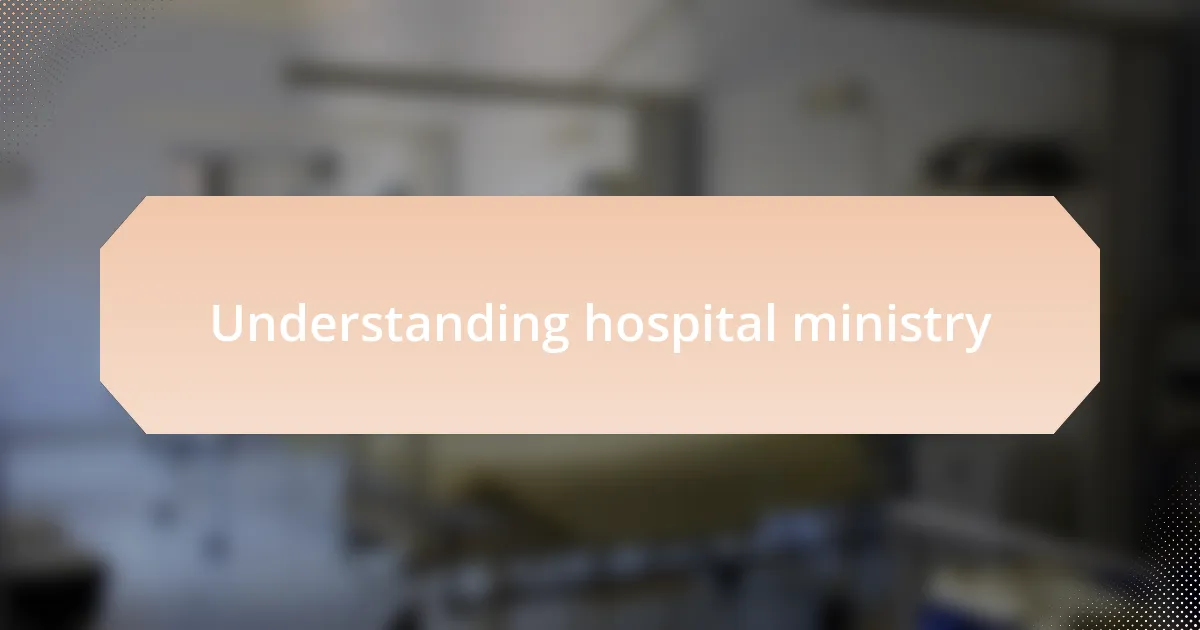
Understanding hospital ministry
Hospital ministry is a unique blend of spiritual care and emotional support that serves individuals undergoing medical challenges. Reflecting on my experiences, I remember a moment when a patient shared how a simple visit from a chaplain transformed their sense of loneliness into connection. This reinforces the idea that sometimes, just being present can offer immense healing.
As I engage with patients, I often wonder: how can we truly meet their spiritual needs in such a critical time? It’s not just about prayer or scripture readings; it’s about active listening and compassionate presence. I’ve seen firsthand how holding space for their fears and hopes enables them to find strength amid vulnerability.
Moreover, the ministry isn’t limited to patients alone; it’s equally about supporting families, who experience their own emotional turmoil. Once, I witnessed a family member break down in tears and found comfort not just in words, but in shared silence, signifying that empathy transcends language. This understanding deepens my belief in the transformative potential of hospital ministry—it truly nurtures the soul during life’s hardest battles.
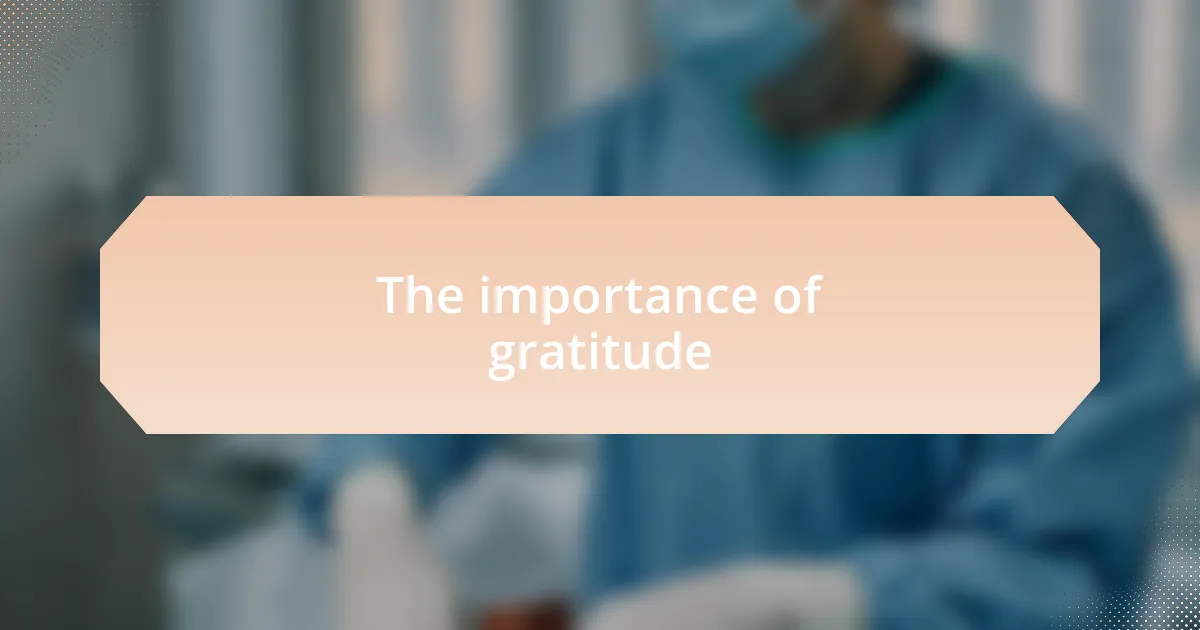
The importance of gratitude
Gratitude serves as a powerful antidote to despair, particularly in a hospital setting. I recall a time when a patient, facing a grave diagnosis, expressed gratitude for the little things—like the warmth of the sun streaming through the window or the comforting taste of homemade soup. This perspective shift revealed how focusing on small blessings can provide immense strength and hope during challenging times.
In my experience, cultivating gratitude has a ripple effect. When patients express gratitude, even in the midst of pain, it influences not only their emotional state but also the atmosphere in the room. I once noticed how a patient’s simple words of thanks uplifted the spirits of the entire care team, creating a sense of purpose in their work. Isn’t it remarkable how an attitude of gratitude can foster connection and healing among everyone involved?
The act of appreciating what one has, rather than fixating on what is lost, can be genuinely transformative. I’ve witnessed patients who, despite their circumstances, find joy in their relationships, hobbies, or even their resilience. This insight leads me to wonder: what if we all took a moment each day to acknowledge our blessings, however small? I believe that such practice could nurture not only personal healing but also enrich the community around us.
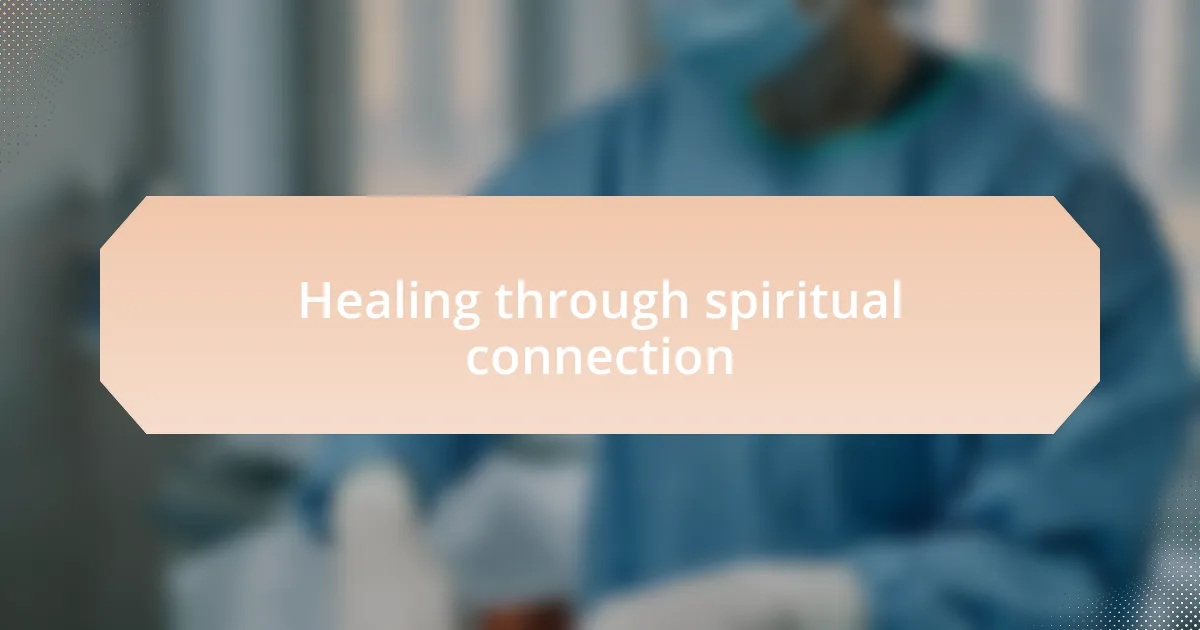
Healing through spiritual connection
In my journey witnessing the powerful bond between spirituality and healing, I’ve often found that prayer or meditation can create a deep sense of connection. Just the other day, I sat with a patient who shared that her daily quiet time helped her feel anchored amid the chaos of her treatments. It made me reflect: how often do we allow ourselves those sacred moments to reconnect?
I remember a particular instance where a group of patients came together for a small prayer circle in the hospital chapel. The atmosphere shifted as they shared their hopes and fears; their spirits seemed to lift collectively. It struck me that this shared spiritual practice not only fostered individual healing but also built a community of support—a reminder that we are never truly alone in our struggles.
Spiritual connection, I believe, offers a profound source of strength. In my experience, those who embrace their faith or spirituality often report greater emotional resilience. It poses an interesting question: can nurturing our spiritual selves during times of hardship be the key to unlocking deeper layers of healing? I’ve come to understand that when patients find solace in their beliefs, they often experience a renewed sense of purpose, which can be life-changing.
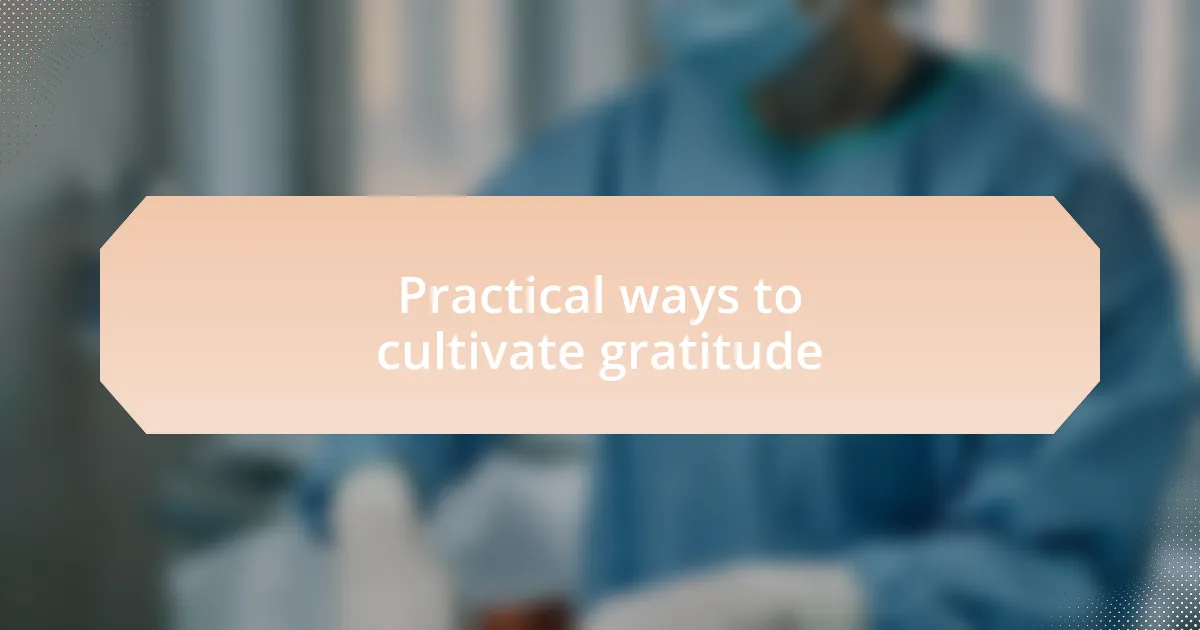
Practical ways to cultivate gratitude
One practical way to cultivate gratitude is by keeping a daily journal where you note even the smallest blessings. I remember starting my own gratitude journal during a particularly tough season of my life. Each night, I would reflect on my day and try to list three things I was thankful for, no matter how minor they seemed. Over time, I noticed those small moments of joy—like a good cup of coffee or a kind word from a friend—began to shine brighter in my life.
Another effective method is expressing gratitude directly to others. I’ve found that taking a moment to send a heartfelt message or even simply saying “thank you” face-to-face can create a ripple effect of positivity. Have you experienced the warmth that comes from sharing appreciation? I wrote to a nurse who went above and beyond during my loved one’s hospital stay, and the joy in her response reminded me that gratitude not only uplifts us but also strengthens our connections with others.
In group settings, I’ve seen the power of a gratitude circle, where everyone takes turns sharing what they are thankful for. I participated in one at a community center, and witnessing the smiles while hearing diverse expressions of gratitude was contagious. It reminded me that gratitude isn’t just a personal practice; it’s a communal experience that can facilitate healing for all involved. How might your own life change if you began to consciously participate in such practices?

Personal experiences with gratitude
When I reflect on my own journey with gratitude, one moment stands out vividly. A few years ago, I faced a personal crisis that left me feeling isolated and lost. In the midst of that darkness, I started calling a friend each week just to share what I was grateful for, and the simple act of vocalizing my blessings shifted my perspective. Have you ever noticed how sharing joy can amplify it?
There’s something so profound about heartfelt gratitude that I experienced during a family gathering last year. As we sat around the dinner table, we took turns sharing moments of thankfulness. I remember becoming emotional when my sibling expressed gratitude for our family’s support during a rough patch. That openness created a space not only for healing but also for deeper connections among us. Doesn’t it make you think about the power of gratitude to bridge gaps in relationships?
Even on tough days, I’ve found that taking a moment to appreciate the present can be transformative. One evening, after a particularly challenging day at work, I stepped outside and watched the sunset. In that moment of stillness, I allowed myself to feel grateful for the beauty surrounding me. It was a simple yet powerful reminder that even in hardship, there’s always something to appreciate. Have you taken the time to pause and soak in life’s little wonders?
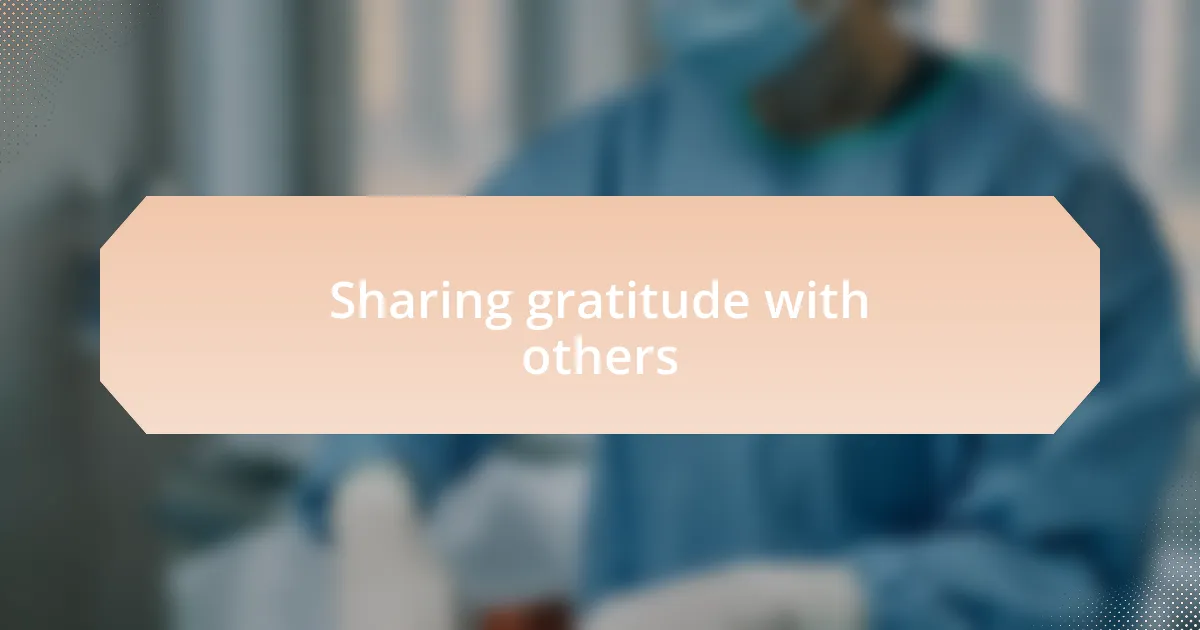
Sharing gratitude with others
One of my favorite ways to share gratitude is through handwritten notes. Recently, I decided to write to a mentor who had a significant impact on my career. As I penned my thoughts, I felt a rush of appreciation for their guidance over the years. Have you ever taken the time to put your feelings into words? It can be a beautiful way to acknowledge the support we often take for granted.
During a recent volunteer event at the local shelter, I encouraged everyone to share one thing they were grateful for. Listening to stories of resilience and hope was truly touching. It struck me how, in those moments, a collective sense of gratitude could lift spirits and foster a sense of community. Isn’t it fascinating how our gratitude can create bonds that transcend individual experiences?
My grandmother used to host tea parties where everyone would express what they appreciated that week. I remember feeling a sense of joy every time someone shared their stories. Those gatherings taught me that when we openly share gratitude, we not only uplift ourselves but also inspire those around us. How often do we miss out on nurturing relationships because we forget to share our appreciation?